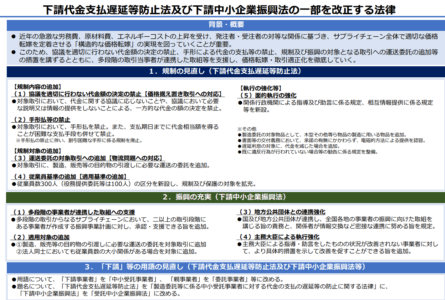2026 Subcontract Act revision in Japan
Nov 17, 2025
- Blog
- 2024 Logistics Problem
- Act against Delay in Payment of Subcontract Proceeds
- Consignee
- Consignor
- Passing on Labor Costs
- Promissory Note Ban
- Small Subcontractor Transaction Optimization Act
- Subcontract Act Revision
- Subcontracting Promotion Act

Are you wondering what the 2026 Subcontract Act revision means for your business? This revision, which renames the law to the 【Small and Medium-sized Subcontracting Business Transaction Optimization Act】 (formerly the Subcontract Act), aims to ensure fair price pass-throughs and wage increases. It takes effect on January 1, 2026.
1. Law and Terminology Name Changes
The revision replaces the term “subcontracting,” which can imply an unequal relationship. The law’s name and key terms are being updated to reflect a more appropriate modern relationship.
Old Names (Former Law/Terms)
- Act against Delay in Payment of Subcontract Proceeds, etc. (Subcontract Act)
- Small and Medium-sized Enterprise Subcontracting Promotion Act (Promotion Act)
- Parent Business (Oya-jigyōsha)
- Subcontractor (Shitauke-jigyōsha)
- Subcontract Proceeds
New Names (New Law/Terms)
- Act on the Prevention of Delay in Payment, etc. for Small and Medium-sized Subcontractors in Manufacturing Consignment, etc. (Small Subcontractor Transaction Optimization Act)
- Act on the Promotion of Small and Medium-sized Subcontracting Enterprises
- Consigning Business (Itaku-jigyōsha)
- Small and Medium-sized Subcontractor
- Manufacturing Consignment Proceeds
2. Key Revisions to the Small Subcontractor Transaction Optimization Act (Formerly Subcontract Act)
The revision’s main pillars are expanding the act’s scope (employee numbers, transport) and adding new prohibitions (refusing negotiations, banning promissory notes). These will have the largest impact on daily operations.
A. Expansion of Scope
The scope is widened to protect more businesses. It adds criteria based on “employee count” and includes “specific transport consignment” to address logistics issues.
① Addition of Employee Count Criteria
In addition to capital, new criteria based on employee count are added:
- Manufacturing, Repair, & Specific Transport Consignment: 300 employees or fewer (excluding officers)
- Information-Based Products & Service Consignment: 100 employees or fewer (excluding officers)
This prevents businesses with low capital but large operations from avoiding the law.
② Addition of “Specific Transport Consignment”
This adds the consignment of transport (e.g., a shipper consigning transport to a carrier) as a new regulated transaction. This targets issues in logistics, such as unpaid loading and waiting times.
B. Addition of Prohibited Acts
These new rules strengthen regulations against practices that hinder fair transactions, such as refusing to raise prices when costs increase.
① Prohibition on Unilaterally Setting Prices by Refusing to Negotiate
It is prohibited to unilaterally set prices by refusing to negotiate. This applies if a business refuses to participate in price discussions requested by a subcontractor. It also applies if they fail to provide necessary information during those talks. This new rule ensures a fair negotiation process, separate from the existing “unfair price reduction” rule.
② Prohibition on Promissory Notes (Tegata)
Payment by promissory note (Tegata) is prohibited. Additionally, other payment methods like electronic claims or factoring are also banned if they prevent the subcontractor from receiving the full payment amount (including fees) by the due date. This aims to fix business customs that burden subcontractors’ cash flow.
Q. Why are promissory notes being banned?
A. Promissory notes take a long time to convert to cash and were a major factor squeezing the cash flow of subcontractors. The goal is to correct this custom and reduce the financial burden on small and medium-sized enterprises.
C. Strengthened Enforcement and Other Changes
These changes enhance the law’s effectiveness and address other practical issues.
① Strengthened “Area-Wide” Enforcement
In addition to the JFTC and the Small and Medium Enterprise Agency, ministries with jurisdiction over the business will also be given the authority to provide guidance and advice. They will also be added as reporting windows so subcontractors can file complaints without fear of retaliation.
② Other Revisions
- Expansion of Manufacturing Consignment: In addition to metal molds, wooden patterns and jigs used exclusively for manufacturing are now included.
- Electronic Document Acceptance: Providing order forms via electronic methods (like email) is now permitted, regardless of subcontractor consent.
- Expansion of Late Payment Interest: If a price is unfairly reduced (“gen-gaku”), late payment interest (at 14.6% annually) now applies to that reduced amount, calculated 60 days after the original receiving date.
3. Key Revisions to the Promotion Act
This law works with the regulatory act to “support” price pass-throughs for small businesses. The key is strengthening support for the entire supply chain and enhancing administrative “recommendation” powers.
① Support for Multi-Stage Supply Chain Initiatives
This adds support for “Promotion Plans” created by two or more businesses in a supply chain (e.g., Tier 0, Tier 1, Tier 2). This addresses the problem where price pass-through weakens further down the chain.
② Strengthened “Recommendation” Authority
If a business fails to improve after receiving guidance, the relevant minister can now issue a “recommendation” that suggests specific actions. This enhances the effectiveness of price-pass-through enforcement.
③ Expansion of Scope
Similar to the main Act, the Promotion Act’s scope is expanded to cover: (a) transport consignment from shipper to carrier, and (b) transactions between businesses based on employee size (including SME-to-SME transactions not covered by the main Act).
④ New Duties for National and Local Governments
Local governments are now tasked with promoting initiatives for small subcontractors. National and local governments must work closely to promote these goals.
This legal revision aims to overhaul long-standing business customs, fostering a foundation where consignors and subcontractors can coexist and create sustainable value across the entire supply chain. It strengthens both regulation and promotion to structurally establish fair price pass-throughs.

You are welcome to contact us via the Contact Form to discuss and for more information.
